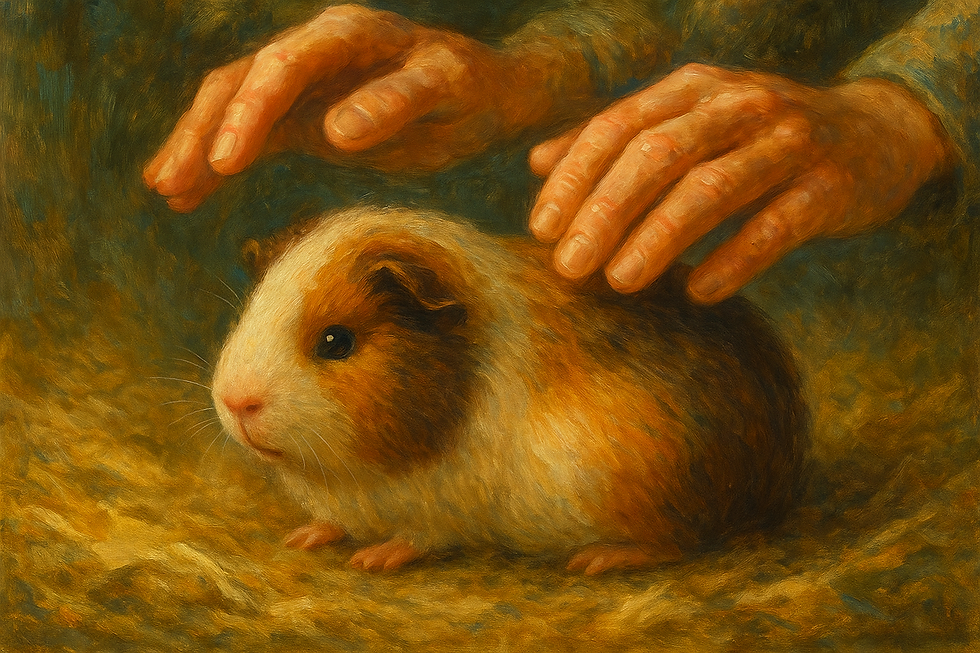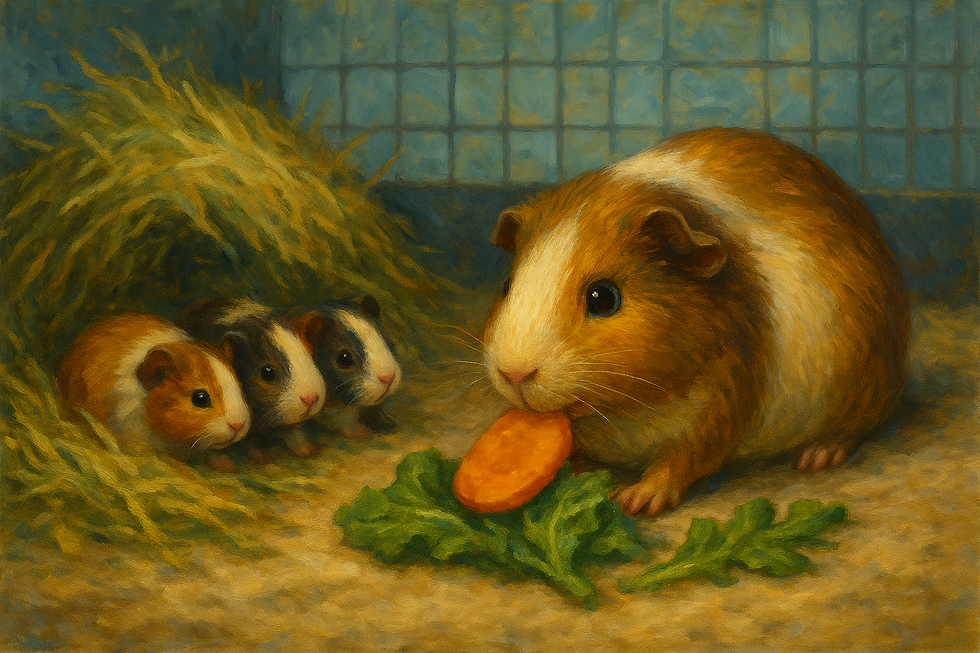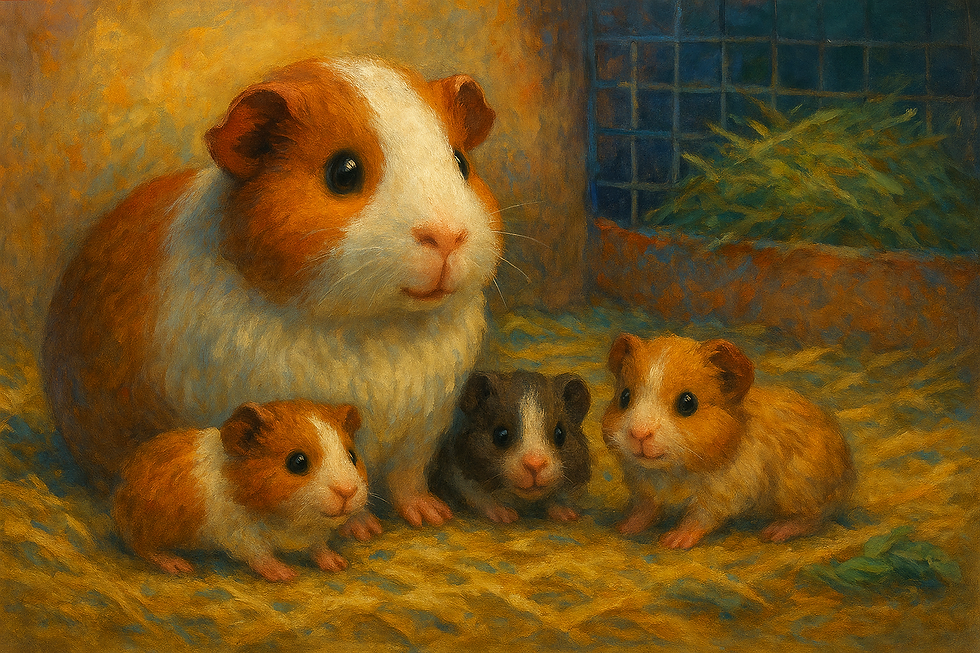What to Do If Your Guinea Pig Is Pregnant
- Sarah Robarge

- Sep 6, 2025
- 3 min read

It usually starts with a hunch. You notice your sweet piggy is looking a little rounder than usual. She’s hungrier, thirstier, and maybe not quite as bouncy as before. You gently stroke her side and think—was that a tiny kick? Suddenly, the possibility sinks in: your guinea pig might be pregnant.
If you’re here, you’re probably feeling both curious and a little nervous. Guinea pig pregnancies can be joyful, but they’re also risky. Let’s walk together, step by step, through what to do if your cavy is expecting.

Recognizing Pregnancy
Pregnancy in guinea pigs is often unplanned and sometimes hard to detect at first. Watch for:
Weight gain and that classic pear-shaped belly.
Increased appetite and thirst—she’s eating for more than one now!
Fetal movement—later in pregnancy, you may feel the pups kicking.
But don’t rely on looks alone. The safest way to confirm is with an exotics vet visit.

Preparing the Environment
Your piggy needs a calm, secure home more than ever.
Keep her in a spacious, single-level cage with soft bedding.
Remove ramps or platforms that could pose a fall risk.
Separate males immediately—a pregnant sow can become pregnant again within hours after giving birth.
Think of her cage as a cozy nursery where stress is kept to a minimum.

Nutrition Matters
Pregnant sows need extra nutrients, especially calcium and vitamin C.
Unlimited fresh hay for digestion and dental health.
Alfalfa-based pellets (at least during pregnancy and nursing).
Vitamin C–rich veggies like bell peppers, kale, or parsley.
It’s a lot like making sure a human mom has her prenatal vitamins—what she eats now will keep her strong and give her pups the best start.

Gentle Care
Pregnant guinea pigs are fragile, and complications are common.
Avoid rough handling. If you must pick her up, do so carefully and only when necessary.
Schedule vet checkups to monitor her health.
Watch for red flags: loss of appetite, difficulty moving, or labored breathing. These are signs to seek immediate vet care.
Think of yourself as her guardian angel—close by, protective, but never overwhelming.

Birth Time
Here’s the surprising part: guinea pig births are fast. Often, it’s over within 30 minutes.
Pups arrive fully furred, eyes open, and ready to eat solids.
Mom usually handles everything—cleaning and nursing the babies.
Your job? Watch quietly. Intervene only if something clearly goes wrong.
Imagine waking in the morning to find your herd has quietly grown overnight—it’s often that quick and that magical.

Meet the Pups
Within minutes, the babies may be nibbling hay, exploring, or chasing each other clumsily around the cage. It’s astonishing to see such tiny creatures come into the world already prepared for it.
Still, they’ll rely on mom for nursing and comfort. Keep them close to her side, and let the family bond.

Postpartum Care
Motherhood takes a toll. Your sow will need:
Extra calcium in Vegetables and Alfalfa, along with vitamin C, supports recovery.
A clean, cozy cage to reduce stress.
Plenty of rest, while you quietly ensure her babies are gaining weight.
The pups may look independent, but mom is still their anchor in these first weeks.

Preventing More Pregnancies
Here’s the most important step:
Baby boars must be separated by 3 weeks old. At that age, they are already capable of fathering litters—even with their own mother or sisters.
Long-term, consider spaying or neutering through an experienced exotics vet. And remember—countless guinea pigs are waiting in rescues. Breeding should never be taken lightly.

Final Thoughts: If Your Guinea Pig Is Pregnant
If your guinea pig is pregnant, it’s natural to feel worried. Pregnancy is risky for cavies, and not every story has a happy ending. But with gentle care, the proper diet, and a safe environment, you can give mom and her pups the best chance possible.
Most of all, let this experience be a reminder:
Pregnancy is risky. Love them, protect them, adopt—don’t breed.
💌 Stay Connected with The Cavy WhispererWant more tips, guides, and adorable piggy wisdom delivered straight to your inbox? Sign up for our emails and never miss a post.
🛍️ Support the Herd, Shop with Heart. Every purchase in our Cavy Whisperer Gift Shop helps support our work and spread the love for guinea pigs everywhere. From cozy merch to whimsical gifts, there’s something for every piggy parent.
✨ Join our community, support the cause, and celebrate the joy of cavies with us!






Comments